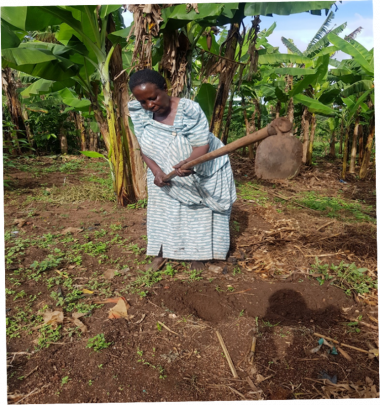A bright light at the end of the tunnel for women like Sarapiya.
Women form approximately 1/2 of the world's population, perform 2/3 of the world's working hours, and generate 1/2of the world's agricultural production! In Africa, women do85% of the agricultural production and processing. Yet women worldwide earn only 1/10 of the world's income and possess only 1/100 of the world's property.
In the East African sub-region, as in many other parts of Africa, women are the primary cultivators.
In Uganda, women own only 7% of the land, leaving 93%with access to land only through a male relation, usually a father, husband, or son.
Land in Uganda is normally passed on through inheritance, traditionally through the male line from father to son. Traditional patrilineal descent remains especially dominant in the rural areas like Mubende district and is characterized by male control of decision-making about who will inherit and administer the estate, and preference for male over female heirs.
Where women do inherit land, they typically receive only a fraction of their brothers' shares and often must share a single parcel with other female heirs. Women are regarded as being unable to own property, and as mere trustees for male kin.
There is a human face to the problem of women and land reform in Uganda.
The story of Sarapiya (below) is typical of the plight of many women in rural Uganda, indicating the need for women's land rights to remain high on the agenda of the women's movement in the country.

My name is Namaganda Sarapiya. I am a 72-year-oldmother of 9 (2 boys, 7 girls) and a resident of Madudu in Mubende district.
By the time of his death in 1988, my late father Mr. Kasumba had a kibanja (piece of land) which measured up to approximately 5 acres in Kjaguzo Local Council 1. All was well, up until the passing of our mother in 2014 when the clan leaders made the decision to split our late father’s Kibanja amongst the 3 surviving children (me and my two siblings).
During the split, my sister and I were each given 1 ½ (One and a half) acres of land, and my brother, the remaining 2(two) acres of land. Being a single mother, I was driven to immediately begin utilizing my piece of land to plant crops like maize and bananas from which I earned income to sustain my family.
The division of land between me and my siblings was to guarantee harmony in the family since each of us had been given a fair portion but that was not the case.
Before my father’s land had come into question, I had my own personal Kibanja still in Kijaguzo where I had built my home, and this had rubbed my brother the wrong way as he insisted that I then did not deserve the portion of land I had inherited from our father, adding that he believed women should not be able to inherit property. It was against this background that he requested the clan heads to allocate my entire portion of our father’s land to him as he was the only male child and therefore, rightful heir to the property.
It got worse on my end when in January 2021, my brother brought a surveyor to inspect my land. I had initially ignored this until I realized that he aimed to take my land away from me. He had gone ahead to remove all the landmarks that were in place and threatened me to stop using the land. I was blocked from cultivating or harvesting any of my produce and had no idea how I was going to survive at this point.
My daughter then encouraged me to stand up against this injustice and walked me to the ActionAid shelter in Mubende where I narrated my grievances. I was given counsel and legal advice. I was also given letters of invitation for my brother and the landlord to a community mediation at the inherited piece of land.
A team from the ActionAid shelter in Mubende together with the Community Liaison Officer and the police thereafter visited my home in Kijaguzo where a community mediation session was held in the hopes of resolving the matter with my brother. During the session, ActionAid staff educated us on the laws governing women’s land rights in Uganda.
It is at this point that my brother and the landlord recognized that they had acted illegally by chasing me off my piece of land. They were told that ignorance of the law was no defense and were educated on the rights and obligations of a landlord and a tenant.
The mediation turned out successful and ended in the signing of a memorandum of understanding between me, my brother, and the landlord. It was agreed that I could continue using my kibanja.
They apologized to me for all the harm they had caused during the process.
I am very happy that I have managed to re-gain access to my land and can comfortably provide for my family. I am also grateful to the ActionAid team and the entire referral pathway for the support they rendered to me and it is a blessing to know we have a place to report in case one is facing any form of violence.